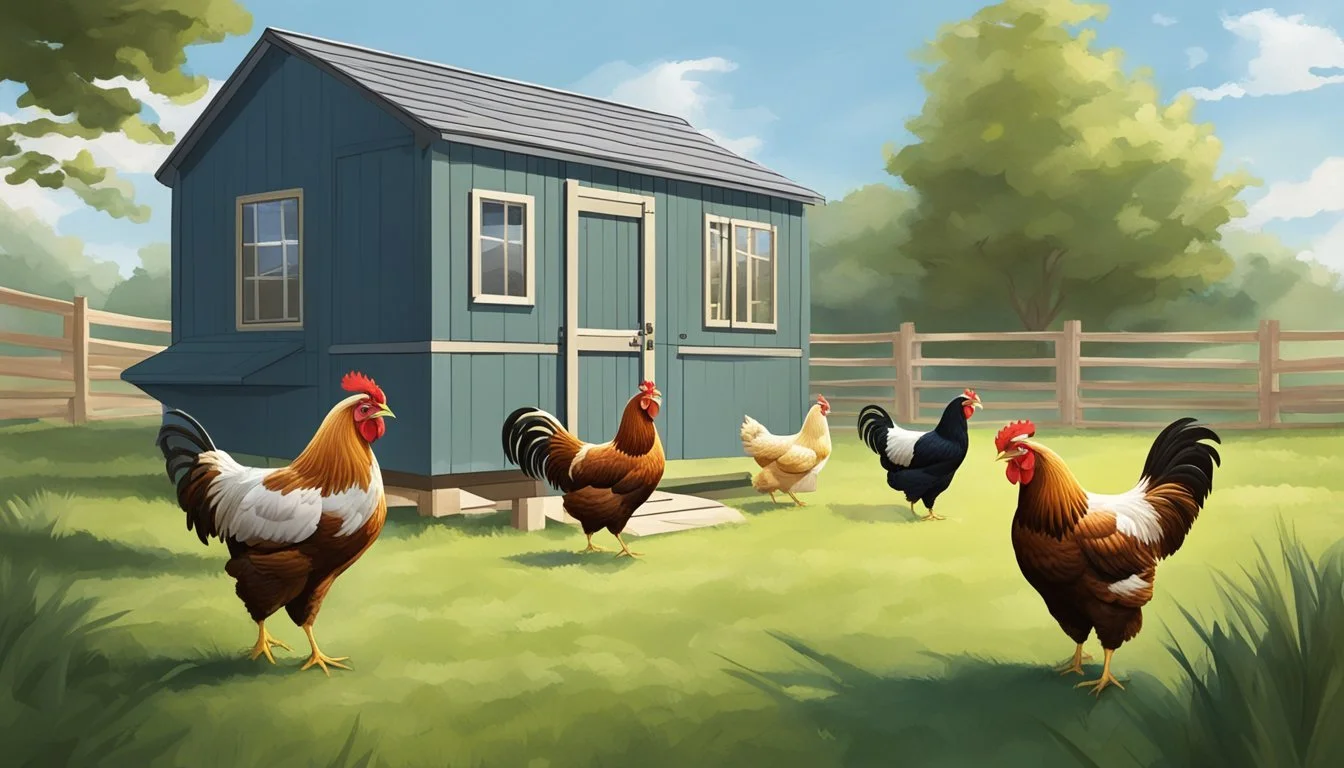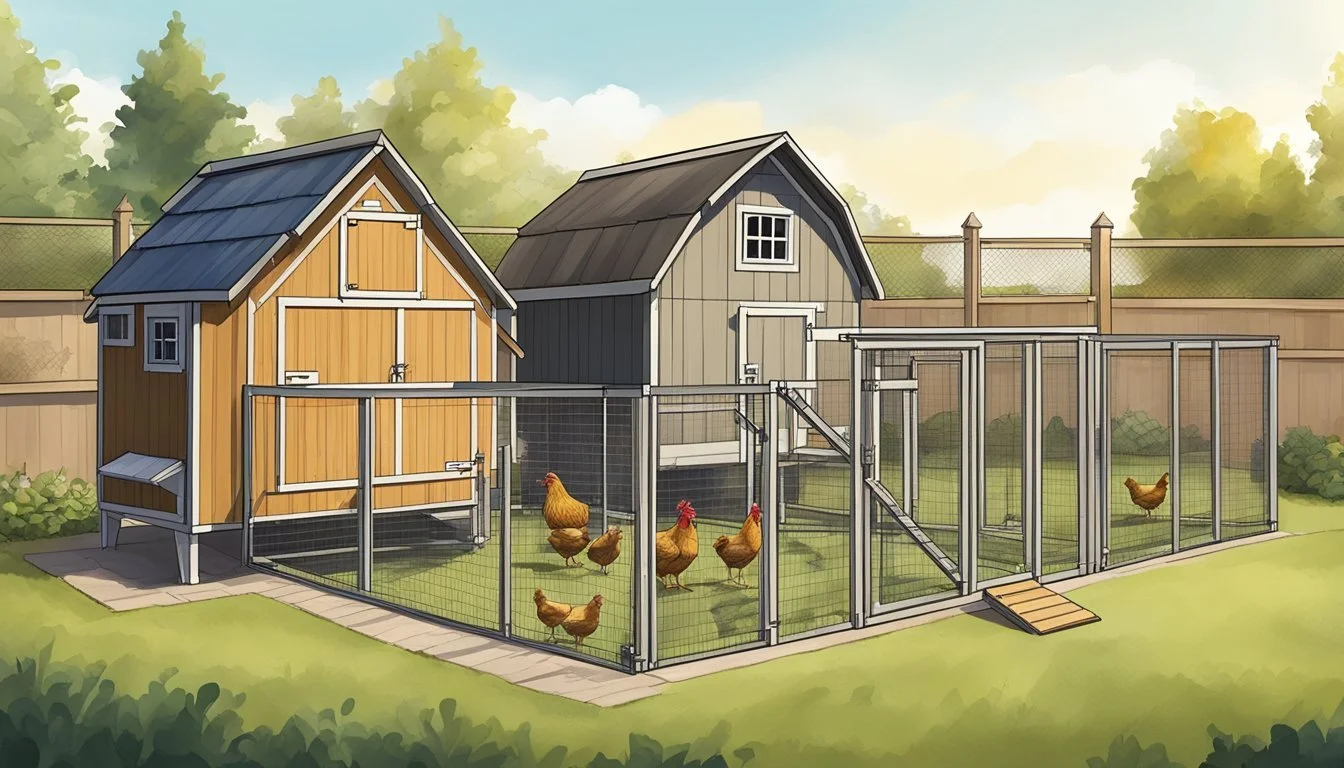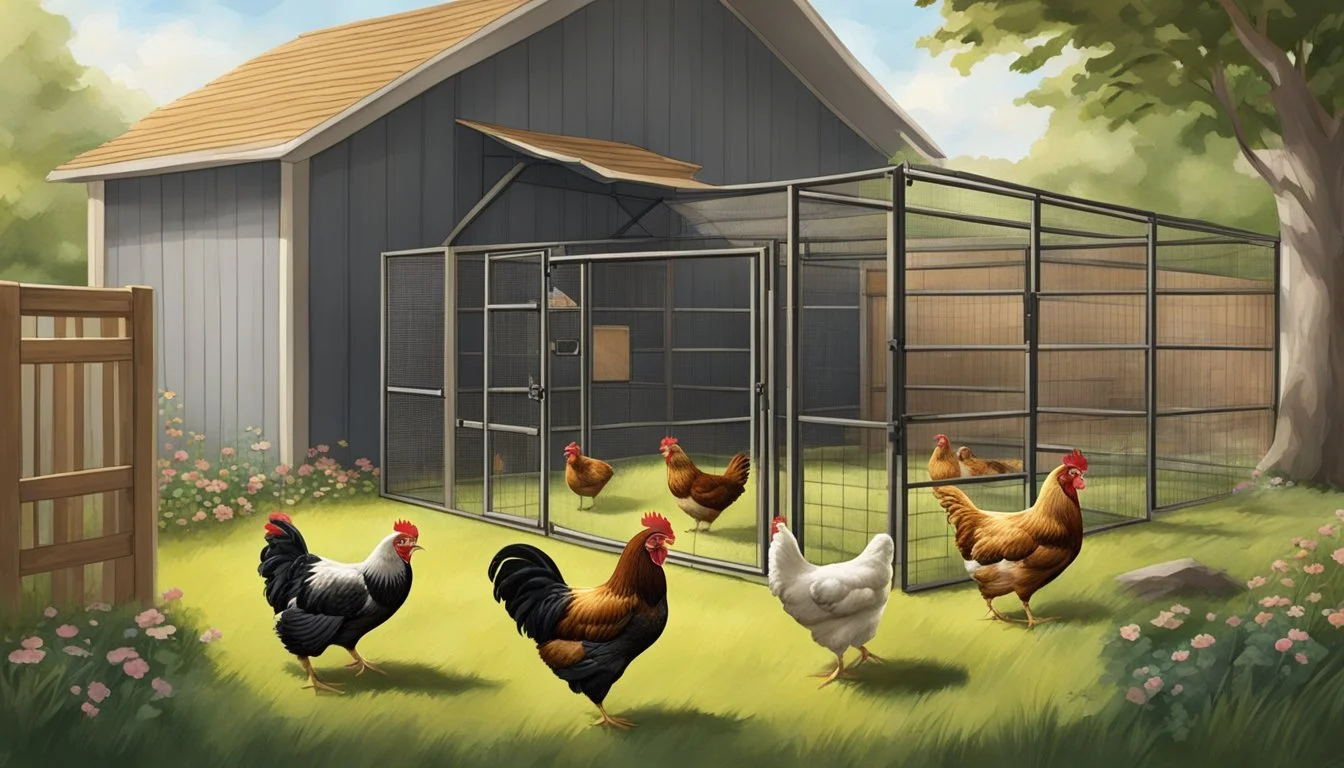Keeping Backyard Chickens in Sioux Falls, SD
Essential Guidelines for Urban Poultry Farmers
In Sioux Falls, South Dakota, interest in sustainable living and locally sourced food has contributed to the popularity of keeping backyard chickens (how long does chicken last?). Residents who are considering adding chickens to their backyard must be well-informed about the city's ordinances to ensure they are in compliance with local laws. Navigating these regulations is essential for successful and lawful urban poultry keeping.
The city of Sioux Falls allows residents to keep up to six chickens without the need for a special permit. However, it's important to note that roosters are prohibited, keeping the neighborhood environments more peaceful. For those interested in expanding their flock, the city requires a permit for more than six chickens, ensuring that animal welfare and community standards are maintained.
Prospective and existing chicken owners in Sioux Falls must also consider the welfare of their chickens, which includes providing suitable housing, protection from predators, and adhering to any specific spatial requirements set forth by the city. Adhering to these guidelines not only promotes the well-being of the chickens but also helps to maintain good relations with neighbors and the wider community.
Legal Framework
When it comes to keeping backyard chickens in Sioux Falls, South Dakota, residents must navigate a set of specific municipal codes and ordinances. Understanding these regulations is essential to ensure compliance and avoid any legal issues.
Sioux Falls Chicken Ordinance Overview
In Sioux Falls, the city ordinance allows residents to keep up to as 6 chickens on their property without needing a permit. Any number of chickens beyond this limit necessitates obtaining a permit from the city authorities. This regulation is put in place to maintain order and prevent any nuisance to neighbors.
Licensing and Permits Requirements
The acquisition of a permit is mandatory for residents who wish to keep more than 6 chickens. The permit application process is overseen by Sioux Falls Animal Control. It's important to note that permitting may involve inspections or additional requirements to ensure the welfare of the animals and the local community.
Understanding City Limits Restrictions
It's crucial for residents of Sioux Falls to understand that no poultry of any kind is allowed within certain areas of the city limits. Before acquiring chickens, individuals should check the local zoning regulations, as these may affect whether or not they can legally keep chickens on their property.
Rooster and Hen Specific Regulations
While the city ordinance allows the keeping of hens, the regulations regarding roosters are more stringent owing to the potential for noise and nuisance. Therefore, roosters are generally not allowed within Sioux Falls city limits. Even for hens, owners should ensure their coops and chickens do not create nuisances that could negatively impact their neighbors.
Setting Up Your Chicken Coop
When establishing a chicken coop in Sioux Falls, SD, it is essential to consider specific regulations for location, design aspects tailored to chickens' needs, and protocols to maintain a hygienic and secure environment.
Choosing the Right Location
Selecting an optimal location for your chicken coop is vital. Coops should be placed at least 25 feet from any neighboring residences to comply with city regulations. Additionally, consider the coop's orientation to facilitate natural light entry and protect from harsh weather conditions.
Setback requirements: Keep a minimum distance from dwellings as prescribed by local laws.
Sunlight and shade: Place the coop to receive ample morning light but also provide shaded areas for the hot afternoons.
Drainage: Ensure the ground has good drainage to prevent standing water.
Coop Design and Space Requirements
The coop, or hen house, should offer adequate space for chickens to engage in natural behaviors. Each bird requires 2-3 square feet within the coop and 8-10 square feet in an outside area for optimal health and clean conditions.
Coop dimensions: Ensure ample room inside for the birds to roost, lay eggs, and move freely.
Ventilation: Integrate proper ventilation to optimize air flow and prevent moisture buildup.
Predator-proofing: Use hardware cloth for fortification and secure latches to protect against predators.
Maintaining a Clean and Safe Environment
Regular maintenance of the chicken coop is mandatory to prevent health hazards and deter vermin. Implement a routine to ensure cleanliness and safety.
Daily upkeep: Remove waste daily, check for signs of pests, and replenish food and water.
Weekly cleaning: Perform more thorough cleanings weekly to maintain a healthy environment.
Seasonal considerations: Adjust maintenance routines to address seasonal changes, such as increased ventilation during summer and insulation during winter.
In Sioux Falls, all owners of backyard coops must adhere to coop restrictions to create a sustainable and neighbor-friendly environment for raising domestic fowl.
Chicken Care and Management
Proper care and management are crucial for the wellbeing of backyard chickens in Sioux Falls, SD. This section provides detailed guidance on feeding, health care, egg handling, and controlling noise and odor.
Feeding and Nutrition
Backyard chickens require a balanced diet comprising grains, proteins, and necessary vitamins and minerals. It is essential to provide layer feed to hens for consistent egg production. Additionally, access to clean water is vital.
Layer Feed: Typically includes corn, soybean meal, vitamins, and minerals.
Supplements: Oyster shell or crushed eggshells can supplement calcium.
Clean Water: Refill and clean water containers daily to prevent diseases.
Health and Veterinary Care
Regular health checks and preventive care ensure backyard chickens are free from diseases. Vaccinations and parasite control are central to a chicken's health plan.
Vaccinations: Protect against common ailments; consult a local veterinarian.
Parasite Control: Regularly check for and treat lice, mites, and internal worms.
Emergency Care: Keep contact information for a veterinarian who specializes in poultry.
Egg Production and Harvesting
Egg production relies on breed, age, nutrition, and lighting conditions. Eggs should be collected daily and stored properly to maintain freshness.
Egg Collection: Perform daily to avoid soiling and potential egg-eating by chickens.
Storage: Keep eggs at a consistent, cool temperature; refrigeration is recommended.
Handling: Wash hands before and after handling eggs to minimize contamination.
Managing Noise and Odor
To minimize disruptions in residential areas, noise and odor from backyard chickens must be controlled through coop design and cleanliness.
Noise Control: Position coops away from neighbors and provide distractions such as treat toys.
Odor Management: Regular coop cleaning and proper waste disposal are necessary.
Design: Coops should have proper ventilation to reduce humidity and odors.
The management of backyard chickens in Sioux Falls requires consistent care and attention to ensure the health and productivity of the flock, while also respecting the residential context of such an undertaking.
Community Relations and Responsibilities
Keeping backyard chickens in Sioux Falls, SD, involves understanding and managing the impact on community relations and adhering to responsibilities to maintain harmony with neighbors. Homeowners must navigate concerns effectively, prevent nuisances, and engage in responsible chicken keeping.
Addressing Neighbors' Concerns
It is essential for homeowners to proactively address any potential concerns that their neighbors might have regarding the presence of chickens. Communication is key; they should share their chicken-keeping plans and openly discuss topics such as coop location, noise, and odor control. A frugal urban homesteader may also underscore the benefits, such as reduced food waste and availability of fresh eggs, to help alleviate any reservations from neighboring residences.
Preventing Public Nuisance
To prevent chickens from becoming a public nuisance, chicken keepers must ensure their coops are clean and that the chickens do not stray onto other properties. Noise management is particularly important; roosters are known for their early morning crowing, so they are typically not favored in urban settings. Homeowners may need to obtain a special permit if they wish to keep more than a specific number of chickens, which further helps in regulating potential nuisances.
Promoting Positive Chicken Keeping Practices
Promoting and adhering to positive chicken keeping practices works towards a more harmonious relationship with the community. This includes implementing best practices for coop construction, waste management, and predator prevention. These efforts not only demonstrate a commitment to the well-being of the chickens but also to the cleanliness and safety of the neighborhood. Chicken keepers should stay informed about local ordinances to ensure their practices are within legal parameters.
Additional Considerations
When undertaking backyard chicken keeping in Sioux Falls, SD, it's imperative to consider the full spectrum of local bylaws and poultry-related practices. This includes knowledge about other types of permissible fowl, waste management, and tapping into local expertise for successful husbandry.
Other Permitted Poultry and Fowl
In addition to chickens, residents may wish to keep other types of poultry such as ducks, turkeys, geese, rabbits, and pigeons. One should note that written approval is necessary for keeping more than six poultry birds, including ducks and geese. This approval must be obtained from the appropriate city authorities or organizations like the Humane Society. Breeding of these animals is another aspect that might require additional permits and adherence to specific square footage per bird requirements to ensure humane living conditions.
Composting Chicken Waste
Efficiently managing and composting chicken waste is pivotal to maintaining a healthy and odor-free backyard environment. It's recommended that residents create a composting plan that aligns with the city's health and safety regulations. Composting not only aids in waste reduction but also provides nutrient-rich material that can be used to improve garden soil.
Benefits of Composting:
Reduces waste sent to landfill
Produces valuable organic fertilizer
Composting Tips:
Maintain the right balance of browns (carbon-rich materials) and greens (nitrogen-rich waste) for optimal decomposition
Regularly turn the compost pile to aerate and speed up the process
Keep the pile moist, but not too wet
Local Resources and Support
To ensure ongoing success with backyard chicken keeping, accessing local resources and support is invaluable. Organizations such as the Sioux Falls Humane Society can offer guidance on best practices, while local poultry clubs may provide a forum for sharing experiences and advice. Responsibilities of chicken owners also extend to being considerate neighbors by minimizing noise and maintaining clean, orderly, and aesthetically pleasing coops.
Residents should keep the contact of Sioux Falls Animal Control (605) 367-7230 handy for any queries or to obtain necessary permits related to backyard poultry keeping.
Appendix
This section serves as a resource guide and provides answers to common questions for individuals interested in backyard chicken keeping in Sioux Falls, SD.
Sioux Falls Chicken Keeping Resources
Residents of Sioux Falls seeking information on urban chicken farming can refer to the following valuable resources:
City of Sioux Falls Animal Control: For clarifications on ordinances and permits, residents can contact Animal Control at (605) 367-7230.
Sioux Falls Urban Agriculture: This local entity provides guidance on city regulations and best practices for keeping chickens within the city limits.
ChickenLaws.com: An informative website with details on the number of chickens allowed and permit requirements for Sioux Falls.
Note: The city permits up to six chickens without a permit. However, to keep more than six chickens, a proper permit must be obtained.
FAQs About Urban Chicken Farming
Here are some frequently asked questions about urban chicken farming in Sioux Falls:
Can I keep chickens on residential property? Yes, property owners in Sioux Falls can keep up to six chickens on residential property without needing a special permit.
What if I live in Rapid City, Aberdeen, Tea, or Brookings? Local ordinances vary by city; it's crucial for residents to investigate the specific regulations of their respective cities.
Are there fines for non-compliance? Yes, not adhering to chicken keeping regulations can result in fines. Farmers should ensure compliance with all local ordinances.
Does property size impact chicken keeping? It may, as certain jurisdictions have requirements on space per chicken. Sioux Falls residents should consult urban agriculture guidelines.
Are chickens part of agricultural zoning? Chickens can be part of agricultural zoning regulations, which differ from residential regulations. Property holders should consult local zoning laws.
Remember, while South Dakota does not enforce specific statewide rules for backyard chicken keeping, local city or county ordinances must be followed to ensure lawful and successful urban chicken farming.







